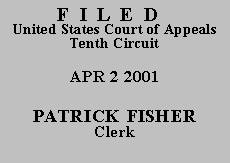

| DAVID L. MARSHALL and
LYNDA E. SHOUGH, |
|
| Plaintiffs-Appellants, | |
| v. | |
| MICHELE S. PRICE; ROBERT WARREN; MICHAEL CURRAN; CITY OF COLORADO SPRINGS; and LEON YOUNG; LINDA BARLEY; TED EASTBURN; WILLIAM F. GUMAN; JUDY NOYES; JAMES A. NOYES; LIONEL RIVERA; RICHARD SKORMAN; GREGORY GARLAND; and MARY LOU MAKEPEACE, personally and in their official capacities, | |
| Defendants-Appellees. |
Plaintiffs David L. Marshall and Lynda E. Shough, proceeding pro se, appeal the district court's Rule 12(b)(6) dismissal of their complaints. Without presenting any factual support, Plaintiffs alleged before the magistrate judge and district court that (1) the doctrine of Separation of Powers prohibited the Colorado Springs City Council from appointing municipal court judges, and (2) certain statements in court by municipal judges and prosecutors were both perjurious and capitally treasonous. On appeal, Plaintiffs reiterate their allegations--again without factual support--adding a claim that sections 16 and 18(2) of article XIV of the Colorado Constitution are unconstitutionally vague. See Br. Aplt. at 2-5.
Having reviewed the briefs and the record in this case de novo, we affirm the district court's Rule 12(b)(6) dismissal for substantially the same reasons given by the magistrate judge and affirmed by the district court in its Order filed October 17, 2000. While we are obliged to construe pro se pleadings liberally, Haines v. Kerner, 404 U.S. 519, 520-21 (1973) (per curiam), Plaintiffs' allegations alone cannot state a valid claim. "[C]onclusory allegations without supporting factual averments are insufficient to state a claim on which relief can be based." Hall v. Bellmon, 935 F.2d 1106, 1110 (10th Cir. 1991). Although Plaintiffs' desire for a hearing is understandable, they must provide in their pleadings factual support "on which a recognized legal claim could be based," id., in order to justify the time and expense of trial. Plaintiffs have failed to provide supporting facts at every phase of this action.
In addition, even if Plaintiffs had presented sufficient factual support, the district court found that they still failed to state claims upon which relief may be granted. States may determine whether its judges are elected or appointed, and nothing in the federal Constitution prohibits that right. See, e.g., Chisom v. Roemer, 501 U.S. 380, 400 (1991) (noting that the Constitution requires Article III judges to be appointed, but acknowledging that Louisiana had chosen to elect its judges). Moreover, judges and prosecutors acting in their official roles are not under oath, and thus they cannot perjure themselves even if they make "materially false" statements (which was not determined here). Colo. Rev. Stat. §§ 18-8-502, 18-8-503. Plaintiffs' latest claim--that sections 16 and 18(2), article XIV, of the Colorado Constitution are unconstitutionally vague--was not raised at the district court level, and thus we decline to consider it on appeal. See Walker v. Mather, 959 F.2d 894, 896 (10th Cir. 1992).
For the reasons stated above, the judgment of the district court is AFFIRMED.
Entered for the Court
Monroe G. McKay
Circuit Judge
*. This order and judgment is not binding precedent, except under the doctrines of law of the case, res judicata, and collateral estoppel. The court generally disfavors the citation of orders and judgments; nevertheless, an order and judgment may be cited under the terms and conditions of 10th Cir. R. 36.3.